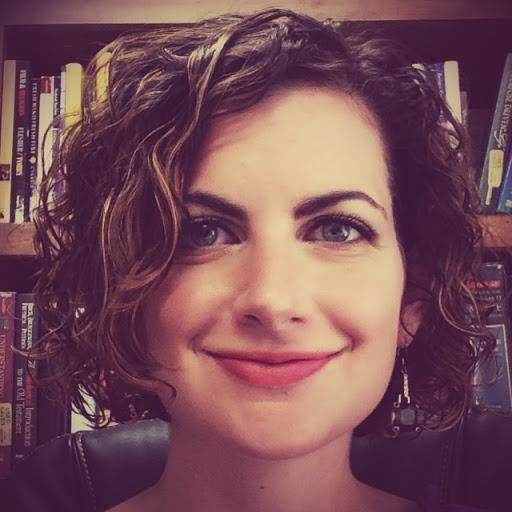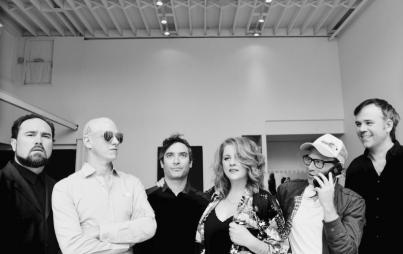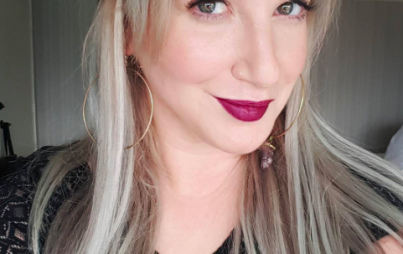
"After you overthrow the patriarchy and establish your socialist feminist paradise, please remember to visit the pastor in Texas who sent you money when you struggled and thank her properly."
This was item 13 in a 25 point list of reminders I sent myself through one of those "write yourself a letter in the future" websites. Me circa 24-year-old self had steep expectations of me circa now, but she knew that no amount of molotovs and men's tears would ever dull the love I have in my heart for Reverend Elizabeth Grasham—Beffy.
I owe her a lot. I'm not sure I'd have thought to transition (from living as a man to as a woman) if I hadn't met her. When we were classmates, I was compelled by a certain caginess around her—when she would smile at me or pour over a half-baked sketch of a Dungeons and Dragons map with me in an empty Taco Bell, I would become very acutely aware that I was slowly deflating. I would collapse under the sincerity of her compassion. She was this whole, complete person.
I had thought my inability to render emotional intimacy around her was just the motions of awkward desire—but in time I came to recognize this as the seedling of inspiration. She was the sort of woman I wished to become: graceful, eloquent, almost death-defying in her capacity for love and mercy. Also, very fashion savvy. My deflating was rather the slow process of shedding the person I could never be.
Beffy moved back to Texas to attend seminary before I had "the chance" to repay her for helping nudge me into saving my own life. In the meantime, I shout back at shadows, I aid the struggling. Just as I had seen her do.
We studied under a theater program with a dispassionate distaste for the mainstream, the accessible. Most theater directors secretly want to "move up" to film one day. We performed King Lear in period costume in front of 12 people on a Saturday night for no money because "the art" demanded it. I have made peace with the decline of theater—any art form not willing to make itself accessible to the audience it's trying to reach does not deserve to be "grandfathered" in on principle.
All that remains of my theater library are assorted photocopied scripts—Chekov and some Shakespeare. I keep them for the same reasons you might keep your little baby boots. We come from strange places. A radicalized journalist in Oakland and a progressive pastor in Galveston, Texas, can trace their narratives back to a tiny theater in central Phoenix and, at least in my case, can identify with some margin of certainty just when and where the laughter of one unshakeably changed the life of the other.
How do you navigate having a religious/spiritual opinion on issues and people not explicitly referenced in the Bible? The secular world serves up this narrative of the religious fervently re-reading the Bible hoping to extrapolate the answer of how to handle any problem that vexes them. Where do you get your guidance on how to serve those not visible in the text?
How to read the Bible is a trillion-dollar question. (Literally, I mean. Do you know how much money is made writing books/blogs/columns about "THIS is how you interpret the Bible!")
During my seminary days, one of the more helpful lectures from a New Testament professor was about the methods we needed to be familiar with to help us interpret and interact with the Biblical texts. You could come at the Bible purely with the Historical-Critical methodology, but that would be like using a hammer as your only tool during a bathroom remodel. You need Social Theory methodology, you need Feminist methodology, and you need Rhetorical methodology; you need a whole variety of methodologies to approach a text that in actuality is 66 different texts.
All that to say . . .
The Bible is an incredible collection, the witness of the people of God about their experiences with and in light of God. But the fact of the matter is that it was written over thousands of years, detailing a wealth of human experiences and cultures and then it was closed. So it doesn't explicitly deal with a whole host of issues and people and experiences that we find commonplace.
As this is the case, we religious people (progressive and fundamentalist) find ourselves having to apply out principles that we read within this heavy tome. The secular world isn't that far off—we do have to extrapolate answers from a text that never may have intended to address those questions in the first place.
In the case of my progressive religious movement, this means we find our locus in philosophical strains we find within the Biblical texts: that God creates and that creation is called good; that God despises injustice and calls us to care for/advocate for/work alongside those who are marginalized; that God's relationship with the creation is based on love; that God sees us in our brokenness and has decided to do something about that.
Boiled down to basics, if I'm in a situation in which there is no clear "Biblical" instruction to guide my actions, then I ask myself one question: "What does LOVE look like for this moment?"
You frequently reference science fiction in your sermons—I specifically remember you citing the themes of fear in Dune and Indiana Jones while discussing the Christian relationship to "fear" (and please correct me if I'm misremembering). Do you think this reaches people who would otherwise feel that church is inaccessible? Are you trying to speak to people who may not be listening to the Bible?
Dune is an awesome book and everyone should read it. Sometimes during children's sermons I use a pretty box to hide something in and then use as an object lesson, and the joke in my family is that the box is named "The Gospel Gom-Jabbar."
Anyway.
All people, across time, geography and any other dividing line, love stories. We consume them, we create them, we trade them, we commemorate them. Stories are social currency. A principal that has proven out true for me is that in any public speaking event, you need to pepper the presentation with stories. Dry statistics or ancient-language studies get boring, even for people who make a profession on them.
But a story that you can hide statistics in and make the same point? Bingo. Do that.
So the stories I tell are from a wide variety of sources—news articles, books I read, TV shows I watch, humorous anecdotes about family life, etc. With a huge, unrepentant focus on science-fiction and fantasy. I reference Star Trek, Star Wars, Lord of the Rings, vampire/zombie/were-animal books, comic books, superheroes and the like.
I think it does reach people, both church people and non-church people, because it eliminates this false boundary between "sacred" stories and "secular" stories.
If talking about the Kardashians will help me communicate a principle on greed that I'm trying to teach, then you bet I'm going to talk about Kim's first (disastrous) wedding. The illustrations act like bridges between the people in the pew (or chair or pub-stool) and the ancient text. And I want people to connect to that ancient text, so science-fiction (or pop culture) is a great way to do that. Plus, Star Trek is awesome.
There is definitely a current of people using the influence of church to maintain power structures (I missed the Sunday School class where we discussed God's policy on illegal immigration). How do you view your relationship, as a clergy woman, to institutional power? Do you feel a prerogative to challenge power structures?
The current complicity of the institutional church with corrupt political powers is grandly ironic and deeply distressing, as the Bible is chock-full of speeches from the Prophets of God against that sort of alliance.
Both the Old Testament and the New Testament teem with references of God's preferential love for the poor, of God's disdain for extortion and exploitation of each other, of God's judgment upon institutions that seek to usurp God's place. In light of that, I see no conflict between my role as a spiritual shepherd of my people and as a voice standing up against institutional powers that disenfranchise or exploit either people or the environment.
That's why lots of clergy-women and men in my branch of the church are public advocates for LGBTQIA equality (marriage and otherwise); that's why I have clergy-friends who focus their ministry not inside churches, but inside legal buildings, advocating for the rights of the disabled, for the rights of the poor, for the economic injustices that all people suffer at the hands of our corrupt systems.

I remember, when we were in school together, I had, in humor, asked you to confirm or deny a classmate's assertion that I was going to hell because I did not believe in God as it was being taught. You were very patient and compassionate in assuring me I would not go to hell. Would you say that the percentage of people you know "in real life" that are actually going to hell is low? Do you feel it's appropriate to tell people you (actually) think they're going to hell? What are your boundaries around that?
The only people that Jesus ever felt the need to talk to about hell (or really, "Gehenna") were the religious people of the day. You know, the folks who thought they had it all right and were using their religious beliefs to disenfranchise others and limit God's love. To everyone else, he spoke of the Kingdom of God, the place where there was radical grace, radical life, radical love, radical value.
To me, leading with hell is the absolute worst way to talk to people about God and the Christian faith. Jesus didn't come to damn; scripture even attests that Jesus was sent because of God's incredible LOVE for the world. Telling people "you're going to hell" is both presumptuous (how could one possibly know the state of another person's soul?) as well as cruel. I don't tell people that, as I have a really hard time reconciling the loving God of scripture with a God who would eternally punish souls in hell.
If I had to say something about "what happens after" (as I'm way more concerned with what we're doing right now), I would err on the side of annihilationism.
If God gives people free will, then that means that God has to give people the choice to say NO to God's-self. Even in eternity. So in that case, God would give people to their choice—death would be a total ending of self. Annihilation. No hell, but also no ultimate transformation.
That makes me really sad, but it's much more palatable than "Guys, I really love you. But since you grew up believing in the religion of your ethnic community, I'm going to torture you forever. Out of love!"
You were emphatic in your support of me, when I came out. My gratitude is almost incalculable—if I did not have your visible and unflinching support I don't know if I'd have had the confidence to slog through those early years of transition. But a lot of people decidedly do not share my experience. There is a lot of hurt and anger in certain marginalized communities, especially in the LGBT community, toward the actions of the church. Do you, as someone who works with LGBT youth, feel a need to apologize for, or accept the responsibility of, the hurt levied against their community by others claiming to be "of God"?
I do feel the need to apologize for and accept the responsibility of the hurt levied against minority communities by people of the Christian faith.
One of the beliefs of the Christian movement is that all people who claim Christ are united in a "family" by Christ rather than by blood. This "family" mentality means (to me at least) that we are responsible to and for each other, that we cannot disavow members of the tribe who act like huge jerks.
I can never say "they aren't Christians" (even if I want to), because I have no way to judge their internal connection with God. But I can say "I'm sorry, the way you were treated was wrong. They are wrong, and you are deserving of both love and human dignity."
The verbal apology is not enough, however; because the Christian movement has been complicit in so much marginalization of minority groups, my apologies have to have legs. I have to be living in a way that my apology is enacted in word and deed, and that is part of the impetus behind my work with LGBTQIA youth.
Religious women seem to get the brunt of the new atheism's ire—they decry brutality toward women with one hand and with the other they insist you are all sheep who don't understand what you've gotten yourselves into. Can you enlighten us on the challenges you face as a woman doing clergy, just within your own community, and what knowledge and resources, if any, religious women can offer intersectional feminism?
To be very frank, I do not have much experience with the religious aspects of intersectional feminism. But, Rev. Mihee Kim-Kort, a Presbyterian clergy woman that I know, is deeply involved with the intersection of religion, politics and women of color. You can read more about her work with Killjoy Prophets, which has a great tagline: "A collective centering women of color feminism. Ending Dudebro Christianity."
More broadly, though, the challenges the female clergy have to deal with run along the same lines that all women have to deal with. If I preach a sermon that is challenging or controversial, chances are that after church, someone will comment on my body rather than the content. During my interview processes to find a new church, people would question whether I could effectively pastor and be a single parent to my young son. When I was getting ready to leave my last charge, an older gentleman questioned whether I was ready to solo-pastor a church as I wore skirts that "were too short."
Beyond that kind of sexism, female clergy still face a "stained-glass ceiling," as we are still less likely to be interviewed for, or to be offered larger congregational bodies to lead. The struggle to negotiate even basic maternity leave is a slap in the face that clergy women face in every single denomination that even deigns to ordain us. No matter that we all have the same costly degrees (at least a Masters, many PhD's) as our male counterparts; no matter that we have undergone the same extensive ordination process; our gender identity still manages to cause distress amongst religious bodies.
One of the greatest resources and communities that I have to uphold me throughout these struggles is a group called The Young Clergywomen Project. One thousand-plus clergy-women from across the globe and in every possible denomination (even rogue Catholics!) share their stories and struggles and joys and resources through our Facebook group. When I was going through a divorce, they were there. When I was deep in a difficult process, they were there. When I wasn't sure how to respond to justice issues, they were there to offer insight.
The group is a God-send, and you should check them out: youngclergywomen.org.
Coming from a (rehabilitated) Catholic background, the notion of clergy who are married and have children has, frankly, flummoxed me. The lesson I had derided from priests was "well, serving God fucks you up in a way where you really shouldn't be in intimate emotional relationships." Can you give me an idea what it's like to have and raise a child while also in an ever-learning, ever-nurturing relationship with God, and if you ever have the feeling of being "a child with a child"?
It is hard to be a clergywoman and a parent, even trickier to be a clergywoman and a single parent.
The Apostle Paul encouraged celibacy amongst those people who wanted to serve the "Kingdom of God," because families and intimate relationships do take energy and focus that could be put to work in God's work. As a parent, I absolutely get that. But, I love being a parent and I did not feel a call to leave my profession behind, so I struggle every day to find a path forward where my work and my family are poured into.
Having a child is a blessing because I suddenly understand aspects of who God is with more clarity: sacrificial love, the ability to love and punish at the same time, the aching patience it takes to watch someone struggle to become their own person. Having a child is difficult because I suddenly come to grips with my own brokenness: to see my own faults reflected back at me, to see the pain my own impatience and unjustness has upon him. Having a child empowers my call, as I want the world to be as God intended for his sake: a place where justice rolls down like a river, a place where love is the law rather than the dollar, a place where people lay down their swords and work together, a place where forgiveness and grace are the norm rather than hatred and cruelty. Having a child also humbles me to an extreme: They just send these tiny humans home with you and you realize "I have no idea what I'm doing."
You realize everyone is just doing the best they can to not break these new humans, that none of us ever feel "old enough" for the responsibility. The joy, the sorrow, the humility, the challenge of parenting does not detract from my ministry; instead, they empower me to do it better.
But sometimes it really sucks that Gareth [Elizabeth's son] misses out on daycare Christmas programs because I have a church service that night. Or that I can never travel on Christmas or Easter because we have church stuff. That's the truth.
You remember, surely, my brief dabbling in Discordianism. To be fair, though, Eris/Discordia was a fucking babe in The Grim Adventures of Billy and Mandy. Can you think of a secular representation of a higher power (Alanis Morissette as God in Dogma, etc.) that you would point to for non-believers or people questioning their faith as an example of "God's nature," removed from the context of the Bible?
American Gods by Neil Gaiman is an incredible work that really resonates with me. There's this throwaway bit in the book where the "gods" are talking about the American Jesus (well, the Jesus who is "ensouled" into being by the belief of Americans). They blithely mention that American Jesus is pretty powerful, but that rarely anyone interacts with him because he's a homeless brown guy. ZING!
That's a pretty accurate example of "God's Nature" to me—that God isn't into power, status or the appearance of "respectability." The God I read of in scripture walks the roads of the disenfranchised, identifies with those who lack justice, and makes the status quo and the power brokers really uncomfortable.
Tell me about a song that really means a lot to you.
I think Katy Perry and I could be BFF's. Seriously, I love her. But especially because before I decided to file for divorce from my ex-husband, I listened to "Wide Awake." Running on the treadmill, in the middle of June, I started to sob and realized I needed to finally let the sad marriage I had go. That song was a catalyst for my new awesome life—so don't judge me.






